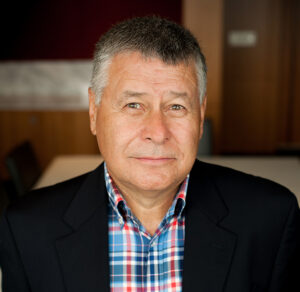Residency and Road Trips
Posted on July 11, 2023
Northern Ontario is full of the warm, bright splendor of the summer season: hot, sometimes humid days and cool summer nights with brilliant hues of pink, purple, yellow, and blue in the skies over our backyards. It’s the perfect time for road trips, both for new residents and myself.
Summer is the end of the MD program academic year and the beginning of the postgraduate training year. NOSM University welcomes 81 new and returning residents to communities across Northern Ontario this year. The transition into residency can be both exciting and terrifying. As students, we work under close supervision, and that changes in residency. As a resident, you must not only demonstrate your knowledge, but you must also diagnose and treat people, including writing orders that may have life or death consequences. It can be overwhelming at first. As you gain experience, you will also gain confidence. The stress will not necessarily lessen; however, you will learn to deal with it better.
This article, “A Day in the Life of a PGY1 Internal Medicine Resident: On Internal Medicine Wards,” is illuminating. Notwithstanding various efforts to address burnout, life-work balance, and the protective measures within the contract between hospitals and the Professional Association of Residents of Ontario (PARO), long days and heavy workloads during postgraduate training persist. Clinical medical culture is also highly hierarchical and often unnecessarily harsh. Sometimes, practising physicians who trained in an environment based on past principles of learning (like “see one, do one, teach one”) still follow those precepts, and can be dismissive of contemporary standards of education that require a safe and positive learning environment. NOSM University has clearly outlined safety requirements, including requirements for resident psychological safety, in this resident safety policy.
In an ideal world, every health-care exchange would be psychologically safe, with all parties afforded the dignity of respectful interactions. An area where NOSM University is leading in this regard is in training health professionals to provide culturally competent care. Thanks to the generosity and involvement of our many partners, a hallmark of our curriculum is the repeated exposures and learning within Francophone and Indigenous communities, and within rural and remote settings. Since the beginning, NOSM University has defied traditional education, and this makes it hard for accreditors and funders to understand the complexity and costs of a distributed, community-engaged model. No other Canadian medical school provides training in more than 90 communities across a geographic expanse of 800,000 square kilometres. But rather than taking an “off-the-shelf” approach to delivering health professional programs, NOSM University developed novel education strategies to meet the needs of Northern Ontarians.
Now, as Canada’s first independent medical university, and faced with a major expansion and the growth of health programs, NOSM University is in a singular position to take this philosophy even further—namely, to “throw out the old playbook”—and instead innovate for the future and what the Legislative Act calls our “special mission.” We intend to become an “ecological university,” one that is deeply and ethically aware of and networked with the society around us. Like the fingers of two hands lacing together, we will work to deliver our programs to learners across Northern Ontario, twinned with a broad range of germane and mutually interdependent partnerships that will generate local solutions and be directly linked to societal needs.
One of the joys of my job is road trips and being able to spend time in communities across NOSM University’s wider campus of Northern Ontario—the same communities that act as classrooms for learners. In July, I will be in Atikokan, Fort Frances, Kenora, Sioux Lookout, Wawa and Sault Ste Marie. These near-annual meetings with learners, faculty and administrative staff have reinforced the fact that NOSM University is heavily dependent on the work of many remarkable people outside the four walls of our main campuses in Thunder Bay and Sudbury. Stay tuned for my next blog, where I’ll share some photos and an update. Many thanks to Jacalyn Cop-Rasmussen, Vin Auld, and others for managing the complexity of the arrangements for the President’s Tour.
At the end of June, I was on a road trip of a different kind—I had the pleasure of meeting with Cape Breton University (CBU). In January of this year, Nova Scotia’s Premier announced that CBU would be the site of a new 30 seat medical campus in partnership with Dalhousie University’s Faculty of Medicine. Gina Kennedy and I met with Dr. Kevin Orrell, Interim Associate Dean and Special Advisor to the President, Dr. Tanya Brann-Barrett, Associate Vice President, Academic and Research, and the CBU team who are working to address the physician shortages. I was honoured to discuss NOSM University’s distributed, community-engaged model of education and research. As always, our focus was on the student experience, community engagement, and our shared vision of a thriving physician workforce.
And so, as Nat King Cole crooned in his inimitable baritone, here’s to “Those Lazy, Hazy, Crazy Days of Summer.” Be safe, enjoy yourselves, and take in the beauty of Northern Ontario when you can.
Miigwetch, thank you, marsi, merci,
Dr. Sarita Verma
President, Vice Chancellor, Dean and CEO
NOSM University
If you have any feedback or comments, please reach out at president@nosm.caand follow me on Twitter @ddsv3.

Executive Group Virtual Retreat
Later this week, NOSM University’s Executive Group is meeting virtually to discuss the future of NOSM University and begin early discussions around the next Strategic Plan for 2025–2030. Four key pillars will be discussed: academics, research, clinical and faculty relations, and infrastructure. The group will be divided into four teams, each completing a visioning exercise to determine the top goals to inform the next Strategic Plan.

Congratulations NODIP Grads
NOSM University’s Northern Ontario Dietetic Internship Program—known as NODIP—is celebrating its newest graduating class on Thursday, July 27. This marks the 16th class of NODIP, which is a collaboration with multiple preceptors, communities, and facilities across Northern Ontario. NODIP is a nationally-accredited, professional program that provides practical, hands-on dietetic experience that enables students to obtain the Integrated Competencies for Dietetic Education and Practice, required of an entry-level Registered Dietitian. Including this year’s class, NOSM University has graduated 197 Registered Dietitians. Notably, 100% of the 2022 graduates are practising in Northern Ontario. Congratulations to our newest NODIP grads, and to the entire NODIP team for the exceptional work they do to make it one of the best programs in Canada.
 Congratulations, Order of Canada Recipient
Congratulations, Order of Canada Recipient
On behalf of NOSM University and the Board of Governors, we congratulate Mr. John Beaucage on receiving the Order of Canada for his exemplary leadership and commitment to advancing the well-being and prosperity of Indigenous communities in Canada. His commitment to public service is an example for us all to follow. Mr. Beaucage is a Member of NOSM University’s Board of Governors and a citizen of Wasauksing First Nation. The Order of Canada is one of Canada’s highest honours, awarded to people whose service shapes our society, whose innovations ignite our imaginations and whose compassion unites our communities. We thank Mr. Beaucage for his commitment and outstanding contributions that have benefited our community and our Board.

